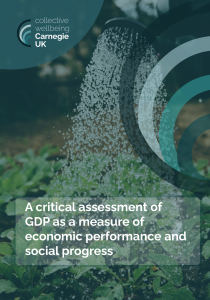This report brings together evidence about why Gross Domestic Product (GDP) has failed as a measure of social progress.
- Democracy
- Economy
- Environment
- Evidence and reports
- Inequality
- Measuring wellbeing
- Society
- Cressida Gaukroger
- 6 June 2023
- ISBN: 978-1-912908-87-5
Gross domestic product (GDP) was never intended to be a measure of wellbeing or progress. It was developed to fill significant gaps in information available about the state of the economy. This report brings together evidence about why Gross domestic product (GDP) has failed as a measure of social progress.
Carnegie UK believe that focusing on the economic output of the UK should not be done at the expense of other aspects of economic wellbeing (like the quality of jobs and decent incomes) or other social, environmental, and democratic priorities.
Too often the GDP debate is seen as binary – you are either for or against it. But there is no reason that the indicator used for government loan agreements needs to be the same one that we use within the UK to set the political narrative on social progress.
To tackle this, we recommend:


International action
to amend the UN System of National Accounts to provide a means for accounting for the environmental and social harms associated with pursuing economic output at all costs.

UK action
from all spheres of UK Government – to develop new measures of social progress that allow us to measure whether things here are getting better over time.

Civil society and academia need to work together
to make the case to the UK Government to carry out a broader review of how economic and non-economic measures are used in budget setting and policy-making within the UK.
GDP is the sum of everything spent by consumers, businesses and the government within a country within a year. Over time, GDP has become the most important number in the world:
- It is embedded in domestic and international structures: GDP is the basis for government loan eligibility as well as within-country accounting.
- It provides useful economic information, helping governments to justify public spending on interventions and infrastructure that contribute to GDP growth.
- The core political narrative of the late 20th Century was ‘Growth is Good’: economic growth has contributed to increases in living standards for many since the end of the Second World War and funded public investment in social goods
- It has communications power: it is one figure that signals improvement, the faster and higher it grows the better things are. While other statistics can be debated and brushed off, the cumulative effect of these factors is that increases and decreases in GDP create the core narrative around which governments operate.
GDP was never intended to be a measure of wellbeing or progress.
- There are many things that GDP does not measure at all which contribute significantly to our collective wellbeing, such as caring, domestic activities, and the natural environment.
- GDP does not take into account current inequalities nor the long term impact of actions, such as environmental impact.
- Focusing policy-making on the pursuit of increasing GDP and economic growth is to the detriment of other social, environmental and democratic priorities.
- Decisions which give everyone what they need to live a good life, now and into the future, should be made on more than GDP.
Criticisms have been levelled for as long as GDP has been calculated. There are also a number of things that GDP does not measure at all which contribute significantly to how we live: including non-financial activities like unpaid caring, or trust in institutions; inequality, or future impacts of activity, like pollution.
We believe that focusing on the economic output of the UK should not be done at the expense of other aspects of economic wellbeing (like the quality of jobs and decent incomes) or other social, environmental, and democratic priorities.
Contact
Download A critical assessment of GDP as a measure of economic performance and social progress
Download pdfHelp us make the case for wellbeing policy
Keep in touch with Carnegie UK’s research and activities. Learn more about ways to get involved with our work.
"*" indicates required fields